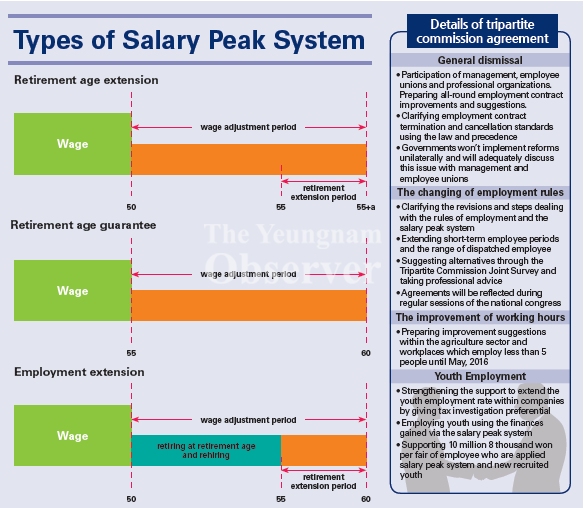
President Park Geun-hye released major reforms on August 6th 2015 of which she introduced major changes to the labor sector which has become a key issue this month. The Tripartite Commission had a conference relating to labor reform specifically dealing with the Salary Peak System and employment flexibility.
This agreement affects employers and was reached through dialogue between labor unions and corporate management. In May of 2013, a law relating to the extension of the retirement age was passed, causing a heavy burden on some companies. Accordingly, they want to adjust employee wages.
The Salary Peak System guarantees an extended retirement age instead of cutting employee wages of those who reach a specific age despite their continuous years of service. This system proposes three types of wage adjustment: retirement age extension, retirement age guarantee and employment extension.
Retirement age extension involves progressively cutting employee wages as they pass the original retirement age of 55 and allows them to remain employed until the age of 60. This applies to companies that did not previously have their retirement age set at 60 until this year.
Retirement age guaranteed also involves progressively cutting employee wages as they near their retirement age of 60. This applies to companies that had already adopted a retirement policy of 60 years old before this year.
Employment extension allows for the rehire of retired employees who are over original retirement age as contract worker. However, such employees would face wage freezes or wage cuts.
Employment flexibility is divided into two issues: easing of general dismissal policies and changing the rules regarding employment conditions such as work hours. Easing of the general dismissal policy clarifies the requirements of fair dismissal for low performing employees. The government has carried these as a guideline for public companies.
Fair dismissal is defined as the ability for companies to dismiss employees who fail to do their assigned duties or obtain adequate results.
Traditionally, it was difficult for companies to dismiss employees unless they did something illegal such as embezzlement. However now, employers are expected to consider all financial aspects such as costs and other factors such as employee behavior at work. However, labor groups assert that fair dismissal means ‘easy dismissal.’ They stated that easing general dismissal policies will be abused as a means to fire employees and suppress labor unions. The government expects that they will need to go through the proper formalities and not dismiss employees directly, even if they have exhibit a substandard job performance.
To change existing rules of employment such as the code of conduct or other changes inflicting negative consequences to employees, a company must get majority vote from the employees. If they have a labor union, companies should obtain a majority agree from them. Notably however, the government is trying to allow for such negative changes to employment conditions to occur without a majority vote from the employees. Labor groups are concerned that companies will negative suppress work conditions in a variety a way and effectively silencing work unions.
Extending retirement age law: Extending employees retirement age to 60. This regulates mandatory clause which is recommendation before.

The Tripartite Commission’s compromised agreement on September 13th 2016 after extended disagreement between parties.
The compromised agreement achieved on September 13th should be considered low level as it postpones key issues such as the dismissal of low performer, the changing of employment rules and other unsorted points such as extending the period of employing of temporary employees and extending dispatch business categories. They prioritized these issues as medium and long-term plans and decided to instead discuss systematic improvement plans. However, regarding these issues, the government did not unilaterally push their view before consulting with managements and employee unions. Regarding this agreement, the Federation of Korea Trade Unions (FKTU) said it is unfortunate that the government did not revise their agreement consultation and stated that when we didn’t reach agreement, the government did not push the policies unilaterally. Business communities are meant to be taking meaningful first steps towards labor reform. However, they expressed regret relating to these issues due to the delayed comprise on things such as low performer dismissals. The Korean Confederation of Trade Unions which didn’t participate in the Tripartite commission reacted violently that this agreement as it opens the road for companies seeking the enactment of labor reform.
Jo Duck-Hyun, Director of Educatiuon & Propagandism of the Korean Confederation of Trade Unions
We are concerned that the labor unions will lose their strength and meaning of existence due to the changing rules regarding employment. Also, any wage reduction system like the salary peak system can reduce private consumption, which can lead to economic crisis. The U.S economic crisis of 2007-2008 was caused by these issues.
As time passes and mechanization and computerization of the workforce is accelerated, productivity will rapidly develop. Having an excessive labor force is inevitable, so we need to change our labor structure. However, preventing the increase of employee income while company profits grow is not acceptable. Therefore we need to change our national system rather than offering labor reform.


